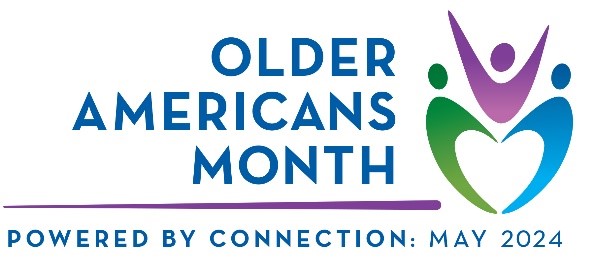
Older Americans Month 2024: What Is NASW Doing to Support Social Work with Older Adults?
Chris Herman, MSW, LICSW
Senior Practice Associate–Aging
May 2024
Introduction
Older Americans Month (OAM) has been celebrated every May since 1963. Led by the federal Administration for Community Living (ACL), OAM recognizes the contributions and achievements of older adults and highlight important trends in aging. OAM is also a time to deepen our commitment to making our communities age inclusive—that is, places that support all of us as we age. This publication explores the OAM theme for 2024, describes selected NASW activities to support social work with older adults, and provides a robust resource list.

The 2024 OAM theme, Powered by Connection, focuses on the profound impact that meaningful connections have on the well-being and health of older adults—a relationship that has garnered well-deserved attention in recent years:
- A study by the National Academies of Sciences, Engineering, and Medicine (NASEM), Social Isolation and Loneliness in Older Adults: Opportunities for the Health Care System, examined how social isolation and loneliness affect the health and quality of life of adults aged 50 and older, particularly those with low incomes and in underserved communities. The resulting report, released just before the COVID-19 pandemic shutdown of 2020, found that loneliness and social isolation significantly increase this group’s risk of developing serious medical conditions and offered recommendations for health care practitioners to help reduce the incidence and adverse health impacts of social isolation and loneliness.
- Research has found a relationship between lack of social support and risk of elder abuse—a topic that will be addressed in greater detail in NASW’s forthcoming Tips and Tools for Social Workers publication addressing World Elder Abuse Awareness Day (WEAAD).
- In 2023, U.S. Surgeon General Vivek Murthy released a public statement, Our Epidemic of Loneliness and Social Isolation: The U.S. Surgeon General's Advisory on the Healing Effects of Social Connection and Community . Such advisories “are reserved for significant public health challenges that require the nation’s immediate awareness and action” (p. 6). Citing multiple examples of how loneliness and social isolation increase the risk and severity of cognitive, mental, and physical health conditions in older adults, the Surgeon General asserts:
While social connection is often considered an individual challenge, this advisory explores and explains the cultural, community, and societal dynamics that drive connection and disconnection. It also offers recommendations for increasing and strengthening social connection through a whole-of-society approach [the National Strategy to Advance Social Connection]. (p. 6)
The Surgeon General’s office has built on this report by developing a social connection priority webpage and a related webpage dedicated to the multipronged national strategy.
These publications reinforce the message of OAM 2024: By recognizing and nurturing the role that connectedness plays, we can mitigate loneliness and social isolation, thereby promoting health and well-being as we age.
Visit https://acl.gov/oam/2024/older-americans-month-2024 for written and graphic materials, activity ideas, and other resources to enhance your Older Americans Month celebration.
NASW Activities to Support Social Work with Older Adults
Social work with older adults is a high priority for NASW throughout the year. A list of selected recent and upcoming NASW activities in this area follows:
- 7th Annual Older Adult Mental Health Awareness Day (OAMHAD) Symposium—This free, daylong symposium included seven social work presenters and keynote presenter Jenifer Lewis, aired live on May 2 and is now available on demand. (Social work continuing education [CE] is not available for the on-demand program.) NASW participated in the OAMHAD steering committee for the second consecutive year. The event, which marks the intersection of OAM and Mental Health Awareness Month (federal government microsite; NASW Tips and Tools for Social Workers publication), is hosted by the National Council on Aging and cosponsored by the Administration for Community Living, Health Resources and Services Administration, and Substance Abuse and Mental Health Services Administration, in partnership with the E4 Center of Excellence for Behavioral Health Disparities in Aging at Rush University. NASW served on the steering committee for the second consecutive year.
- National Coalition on Mental Health and Aging (NCMHA)—This coalition convenes consumers, professionals, and government agencies to improve access to high-quality mental health and substance use services for older adults and their families. As a second-term member of the NCMHA executive committee, NASW helped plan educational meetings for members, revise the bylaws, and update the coalition website. NCMHA welcomes new coalition members, whether individuals, local, state, or Tribal organizations or coalitions, or national organizations.
- LGBTQIA+ Aging: Rights and Policies that Social Workers Need to Know—This one-hour webinar is available to members of NASW Specialty Practice Sections and worth one social work CE credit. The live program is on May 20, and the on-demand version will be available (also for CE credit) soon thereafter.
- Dignity of Risk: An Integral Component of Person-Centered Work with Older Adults—This interactive workshop will be offered by an interdisciplinary panel, including NASW staff, as a preconference to the upcoming NASW national conference. Visit the NASW national conference website, scroll to June 19, and click on “preconference workshops” to read the workshop description. This workshop, which is worth three social work CE credits, will not be available on demand.
- Education regarding Medicare annual enrollment—NASW released a detailed Tips and Tools publication to equip social workers to communicate with beneficiaries about changes to Medicare coverage in 2024 and to assist beneficiaries with annual enrollment.
- Advocacy and education regarding the Medicare physician fee schedule (PFS)—The PFS addresses Medicare payment policies for physicians and other individual Medicare providers during any given calendar year (CY, January 1 through December 31). Each summer, the Centers for Medicare & Medicaid Services (CMS) proposes changes to the PFS for the upcoming CY and solicits public comments on this proposed rule throughout a two-month period. The agency then reviews all comments received and publishes a final rule. NASW’s comments on the proposed PFS for CY 2024 and summary of the final rule addressed multiple topics relevant to social work with older adults, including caregiver training services, dental services, diabetes assessment and services, and social determinants of health risk assessment.
- Improving access to social work services for Medicare beneficiaries—NASW continues to champion the Improving Access to Mental Health Act (S. 838/H.R. 1638). This legislation promotes high-quality mental health care across settings in three ways: (1) enabling clinical social workers to bill Medicare Part B independently for services provided to beneficiaries in skilled nursing facilities, (2) enabling clinical social workers to bill Part B for Health Behavior Assessment and Intervention services, and (3) increasing Part B reimbursement rates for clinical social workers. NASW presented information about these access bills to multiple coalitions, including the Leadership Council of Aging Organizations (LCAO), the Eldercare Workforce Alliance, and NCMHA, and secured more than 60 signatories to a sign-on letter supporting the legislation. Additionally, as a member of the Coalition for Social Work and Health, NASW supports the Integrating Social Workers Across Health Care Settings Act (H.R. 4638). This bill authorizes clinical social workers to bill Medicare Part B for all relevant services within their state scope of practice. NASW encourages social workers to use its action alerts to advocate for both the access bill and the integration bill.
- Advocacy for beneficiaries enrolled in Medicaid or Medicare Advantage—NASW submitted comments urging CMS to strengthen access to mental health and substance use services for Medicare Advantage enrollees in three ways: (1) expanding the types of providers and practitioners each plan must include in its network, (2) decreasing the time and distance enrollees must travel to obtain services, and (3) decreasing the maximum wait time to obtain appointments. Similarly, NASW encouraged CMS to enhance access to Medicaid-funded home- and community-based services.
- Revision of NASW Standards for Social Work Services in Long-Term Care Facilities (2003)—A volunteer task force of NASW members is working with staff to update these standards. The revised version will address the use of long-term services and supports by people across the lifespan in both facility and home- and community-based settings. NASW will solicit member comments on the draft standards before publication.
- Improving nursing home quality—The Nursing Home Reform Coalition consists of consumer and workforce advocates, convened by the National Consumer Voice for Quality Long-Term Care, who advocate to realize the goals of the Biden Administration’s initiative to improve the quality of nursing home care. As a member of the coalition, NASW has worked to improve nursing home staffing and transparency. These topics will be addressed in a forthcoming Tips and Tools publication.
- Older Americans Act (OAA) advocacy—The OAA funds many programs in which social workers are involved, such as case management, elder abuse prevention and intervention, family caregiver supports, long-term care ombudsman, nutrition, and transportation. NASW submitted comments on a proposed rule that would amend federal regulations for OAA implementation; some of the association’s changes were incorporated in the OAA final rule. Moreover, NASW is collaborating with other members of LCAO to keep abreast of and inform the OAA reauthorization process on Capitol Hill. (The OAA has been reauthorized multiple times since it became law in 1965. The Supporting Older Americans Act of 2020 [Pub. L. 116–131], which NASW endorsed, will expire on September 30, 2024.) If an opportunity to mobilize social workers in support of OAA reauthorization becomes available, NASW will post an advocacy alert online and disseminate it to the advocacy alert distribution list.
NASW’s activity on the topic of elder abuse—another high priority for the association—will be described in the forthcoming WEAAD Tips and Tools.
Additional events and resources related to OAM follow.
NASW Resources
- Aging practice webpage—Information hub for practice tools, policy and news updates, and other resources pertinent to social work with older adults (other NASW practice webpages)
- Code of Ethics—Available online in English and Spanish; ethics microsite includes webinars, information about ethics consultations for NASW members, and other resources
- Practice standards and guidelines—Partial list; standards for long-term care facilities, palliative and end-of-life care, and clinical social work are under revision
- Aging Specialty Practice Section (SPS)—Optional benefit for NASW members; includes newsletters, webinars, and online forum
- SPS webinars—available live and on demand; partial list
- Supervisory Leaders in Aging (SLA) Principles—On-demand professional development program, developed and launched with support from the John A. Hartford Foundation; consists of 10 modules, available as a certificate (worth 17 CE credits) or on an individual basis
- Other professional development resources
- NASW Press publications (partial list)
- Advocacy webpage—Includes information about NASW’s policy and social justice priorities and activities, as well as the Legislative Advocacy Network
- COVID-19 webpage—Includes information about the Connect to End COVID initiative
- Diversity, equity, and inclusion webpage
- LGBTQIA2S+ webpage
- Racial equity webpage
Older Adult–Focused Initiatives in Which NASW Participates
Aging-Focused Governmental Entities with Which NASW Collaborates
Other Aging-Focused, Federally Supported Organizations and Resources